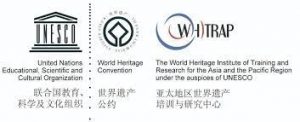World Heritage Institute Of Training and Research – Asia Pacific:

The World Heritage Institute of Training and Research – Asia Pacific (WHITR-AP) has recognised CEPT (Centre for Environmental Planning and Technology, Gujarat) University’s programme in conservation and regeneration as a commended case of Global Innovation on World Heritage Education.
- The World Heritage Education Programme was initiated as a United Nations Educational, Scientific and Cultural Organization (UNESCO) special project in 1994.
- It gives young people a chance to voice their concerns and to become involved in the protection of common cultural and natural heritage.
- The WHITR-AP is a non-profit organization specialized in the area of heritage conservation.
- It is an institute under the auspices of UNESCO, it is the first one established in the developing countries.
- It is an autonomous institution at the service of member states and associate members of UNESCO.
- Mission:
- To strengthen implementation of the World Heritage Convention 1972 in the Asia and the Pacific region.
World Heritage Convention:
- It is one of the most important global conservation instruments which was created in 1972.
- Its mission is to identify and protect the world’s natural and cultural heritage considered to be of Outstanding Universal Value.
- It sets out the duties of States Parties in identifying potential sites and their role in protecting and preserving them.
- By signing the Convention, each country pledges to conserve not only the World Heritage sites situated on its territory, but also to protect its national heritage.
- The Convention is governed by the World Heritage Committee supported by the UNESCO World Heritage Centre, the secretariat for the Convention, and three technical advisory bodies to the Committee:
- International Union for Conservation of Nature (IUCN)
- International Council on Monuments and Sites (ICOMOS)
- International Centre for the Study of the Preservation and Restoration Cultural Property (ICCROM)
- India is a signatory to the convention and has 40 world heritage sites, which includes 32 cultural, 7 natural and one mixed property.
Ramappa Temple in Telangana was the 39th and Dholavira in Gujarat was India’s 40th world heritage site.




